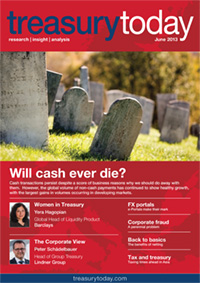Contents
- Editorial
- A tale of two cities
- Women in Treasury
- Women in Treasury: Yera Hagopian, Barclays
- Question Answered
- In charge of IT
- Market View
- Are safe haven currencies back in vogue?
- Insight & Analysis
- Cash: will it ever die?
- Treasury Practice
- What’s yours is mine
- The Bigger Picture
- Milton Friedman
- The Corporate View
- Corporate View: Peter Schädelbauer, Lindner Group
- Regulation
- Taxing times in Asia
- Technology
- Deal or no deal: anatomy of an FX portal
- Back to Basics
- Net benefits
Editorial
A tale of two cities
Miami and Singapore: two very different cities in two very different regions. Yet there were a number of common themes running through the EuroFinance conferences held in these cities in May.
First, as the global financial crisis reaches its fifth anniversary (commonly dated from when Lehman Brothers went down for the count), there seems to be no end in sight regardless of which side of the globe you reside. In Miami’s opening plenary, Omar Sharif, US Economist, RBS Securities, raised the spectre of the US federal debt ceiling, pointed to the decreasing estimates of trend growth (currently at 1.9%) and said quite plainly “it doesn’t feel like a boom time”.
In Singapore, the mood was slightly gloomier for a change – in a straw poll of the participants, just over half (54%) felt more confident about their business prospects in the coming year, whereas in Miami the figure was 60%. This may have been the result of a flurry of negative news around economic data turning sour, the risk of a hard landing in China and a downturn in exports, but in his keynote speech Frederic Neumann, Co-Head of Asian Economic Research and Managing Director, HSBC, was quick to dispel these stories as just “noise”. Yet the Asian markets took another tumble in the last week of May, which has caused more anxiety to creep into market sentiment. An interesting take-away from Neumann’s session was how closely intertwined the growth story in Asia is with the quantitative easing (QE) policies of the West, which begs the question, as the governments in the West begin to unravel their QE packages, will the Eastern economies start to falter?
The second theme is interconnectedness. Despite some economists still floating the idea of a ‘decoupling’ between the emerging and developed markets, the interrelated nature of global finance and business was nowhere more apparent than at the EuroFinance conferences. The global multinational treasury operations are increasingly integrated and ‘joined up’, as illustrated by leading lights in treasury such as AkzoNobel, Microsoft, Yum!, IATA and Omnicom. Presenting in both cities with different treasury team members, their contributions showcased their skill in creating a uniform vision of processes, procedures and technology across the globe.
The third theme is treasury transformation. The vast majority of the conference presentations, as well as the entries from the Adam Smith Awards winners, told impressive transformative stories – whether that was through changing the culture of the organisation, driving rationalisation and centralisation, improving working capital cycles, or implementing innovative supply chain finance programmes. Despite tough times – or maybe because of them – a new breed of treasurer is coming to the fore. Not content to just fight their corner and maintain the status quo, these treasurers are coming out swinging and effectively taking the professional to the next level through a complete re-engineering process.


